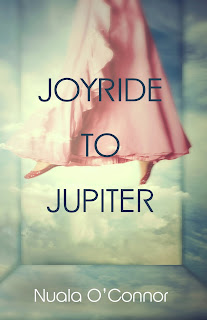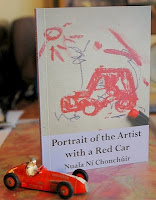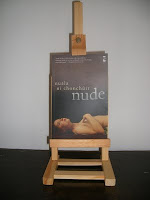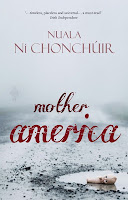 |
| Click on cover to buy. |
Joyride
to Jupiter blog tour
I’ve
just finished my Joyride to Jupiter
and, by Jove, I’m chuffed to bits that Nuala O’Connor, the author of this
deeply moving and provocative collection of short stories is here to answer
some of my questions. Welcome, Nuala.
Your short story collections are
something of masterclasses
of the form.


And I know
you write novels and poetry too.
I wonder if you think the form a challenge
still, and what keeps you coming back to short stories, given that novels are
often regarded as more lucrative and poetry more respected?
Short fiction is a deeply challenging
form; I fear stories and love them. I’m afraid because when I finish one, I
find it hard to believe I’ll ever write another one. I wasn’t always like that
– things spilled out of me. But my head has shifted into the long mode of the
novel and that’s a building and rebuilding process that takes years. Whereas
the story is a faster, freer construction, and it has teetering legs. I wish
story writing was easier, less fraught. Conversely that wobbly tension and
intensity is also what I like about them – there’s an element of puzzle solving
and the scale feels minute but important. I adore the detail of short fiction,
the balancing of motifs and characters and events. Stories are so stunning when
done well – people like Alison MacLeod and Flannery O’Connor amaze me with
their exquisite stories. I long to be that
good so I keep trying.
You
recently wrote a piece for the Irish Times, saying:
“When
I write about subjects that are close to me, such as pregnancy loss and
secondary infertility, I don’t aim to write to expunge myself of grief, but to
work out what happened and why, to get a clear view of a chain of events, and
to see how my characters are able to deal with their troubles on an emotional
level. To see how they survive.”
I
was reading Louise Glϋck’s “Telescope” around
the same time, that is a sort of demonstration of the curiosity you describe, I
think, but a more obvious analysis.
“There is a moment when you move your eye
away...”
The chain is there: the reader is watching the poet watching
themselves, yet the reader can only watch.
“…then you’re in the world again, at
night on a cold hill, taking the telescope apart.”
Glϋck’s observation is clinical – contrasting with the
humanity it reveals – whereas your prose makes the reader less a voyeur and
more a participant in the humanity of your subjects, so that when your stories’
people are behaving in ways that are deeply complexly troubling, such as Mr
Halpin in the title piece, we aren’t on a cold hill observing the writer’s
experiment, we are immersed, uncomfortably close yet able to understand in a
way that perhaps we might never be if we were only shown.
It’s
more than “How can I tell what I think till I see what I say?” (E. M. Forster,
Aspects of the Novel), isn’t it? But is it as simple as showing people who
fuck, shit and fart? What do you think you do with the short story that makes
the reader a participant rather than watcher?
I try to be my characters, to see the world as they see it even if, like Mr
Halpin, that’s in a skewed, unsavoury way. So I might not agree with, or
approve of, things my characters believe or get up to, but I want to write
about people who are not paragons. None of us are, we all have weirdo
tendencies and those are the things that are interesting for an author to
explore. Every character, no matter how horrid (think Humbert in Lolita) has to have a saving grace or
two.
It’s funny when other people start to
comment about how unlikable certain characters of mine are – I often don’t see
it like that. You grow fond of all kinds of nasties when you invent them. Also,
I sometimes wonder if people have incredibly sheltered lives, or maybe they
just don’t read widely, or if that limited reaction is a form of
holier-than-thou-ness. It may be an Irish thing, we have a faux openness that
conceals all kinds of murkiness that we like to pretend doesn’t exist.
In
your book’s epigraph, you quote from Ovid’s Ars
Amatoria, a work in which Ovid uses a form of poetry reserved for elegy to
write a textbook on love; Joyride to Jupiter evokes the happy excitement of
young and godly love yet the stories offer far more mature and nuanced
variations of love:
“But she looks happily bewildered,
because I know what to do to make her feel good and she responds as she always
did, with grunts of pleasure and fierce kisses.
Afterwards we eat. This
has been our ritual for fifty years.” – Joyride to Jupiter, p6
“My parents’ marriage didn’t age
well, there was a certain disgust for each other in all interactions towards
the end.” – Consolata, p17
“I open my arms and the Yellow
descends, poised as a hawk.” – Yellow, p27
“Jesus Christ, no wonder she had to
resort to vials and petri dishes and the syringed swimmers of a stranger.” –
The Donor, p30
“I sit there and mull over how best
to get Lota to help Tito and his brother. Perhaps if I spoil her a little, I
will get my way; she responds well to devotion.” – The Boy from Petrópolis, p41
“I snorted at the idea of anyone
having an affair with my tub-tastic brother-in-law, but Beatrice had turned
forty shades of puce.” – Napoli Abú, p49
“He gripped the steering wheel and
grunted, an attempt to quell the loss surging up through him.” – Tinnycross,
p61
“You saw his naked body and what
fifty-three years had made of it. And he saw you seeing him.” – Fish, p63
“Maria wondered about all the lives
that went on in the apartments in the quays and the house in Inchiore and Bluebell:
the sex, the sorrow, the shame that filled those rooms, under lights and in
darkness, seven days a week.” – Futuretense®, p65
“To my daily surprise the mirror
above the sink tells me that I am old.” – Squidinky, p82
“Malachy stopped and stared at his
nephew.” – Men of Destiny, p92
“I wish some fella would grab me
sometime, in front of him, and kiss the face off me. That’d shake him.” – Penny
and Leo and Married Bliss, p99
“Her hands come around your front and
she unbuttons the top of your uniform.” Room 313, p107
“Maybe she has imagined this person,
this stench-less demigod; her loneliness has conjured him out of the air.” Mayo
Oh Mayo, p115
“Give me sirens and buses and neon
any day. I’m high on the hog here, all right; Parnell behind me, the Spire
before me, and Daniel O’Connell himself down the other end, standing proud. –
Jesus of Dublin, p127
“She bobs down to tread water and
looks up at him. Over the sloshing of the river she can hear him grunt.” – Shut
Your Mouth, Hélène, p135
“I sit on the bed beside her and she
climbs into my lap and looks up into my face; she puts her hands in mine and
with them, I know, all of her faith.” – Girlgrief. P138
“I am thinner now, a shade of the
girl who tripped up and down Nun’s Island with a different man on her arm each
month.” – American Wake, p141
“We head south because there is a
place that Fergus thinks I will like. I am content to be a passenger, inert and
quiet; content to be led.” – Storks, p145
Ovid was known for irony, though
there’s a suggestion Ars Amatoria was
intended to change society for the good of women. “Storks”, the final story in
your collection, deals with exactly the sort of issues you’ve dealt with
personally, as referred to in the Irish Times piece mentioned earlier. I found
myself pulled into stark self-analysis as I read it, having miscarried a few
weeks ago. It could be bleak and grief-weighty, but instead it lifts off into
hopeful optimism. Talk a little about your intentions and hopes for the
collection.
I’m sorry to hear you lost your pregnancy,
Rae, it’s a difficult thing to go through.
This collection is several years
work, maybe seven. I was writing novels during that period, not concentrating
on stories at all, many of them were commissions that I had to complete from snippets.
But there are patterns and obsessions that run through the book: fertility
issues and pregnancy loss, ageing, infidelity, the sea (I live in a landlocked
county), the Virgin Mary (I thought I was over her but, no). So although these
stories are collected, they belong to a time period and my passions and
interests over those years. They belong to each other and, yet, they are
discrete pieces. I hope that they feel a little cohesive as a read but also
that their individuality shines through too. It’d please me if readers were
discomfited but also that they might cry and laugh. My biggest hope is that readers
like the language because language is my god.
Amen to your use of language, Nuala. Thanks so much for coming to talk about Joyride to Jupiter - it's a stellar collection and I wish you the universe for success.
 |
| Click on author pic for link to blog. |
Nuala O’Connor AKA Nuala Ní Chonchúir was born in Dublin, she lives in East Galway. Her fifth short story collection Joyride to Jupiter was published by New Island in June 2017. Penguin USA, Penguin Canada and Sandstone (UK) published Nuala’s third novel, Miss Emily, about the poet Emily Dickinson and her Irish maid. Miss Emily was shortlisted for the Bord Gáis Energy Eason Book Club Novel of the Year 2015 and longlisted for the 2017 International DUBLIN Literary Award. Nuala’s fourth novel, Becoming Belle, will be published in 2018. www.nualaoconnor.com




















































